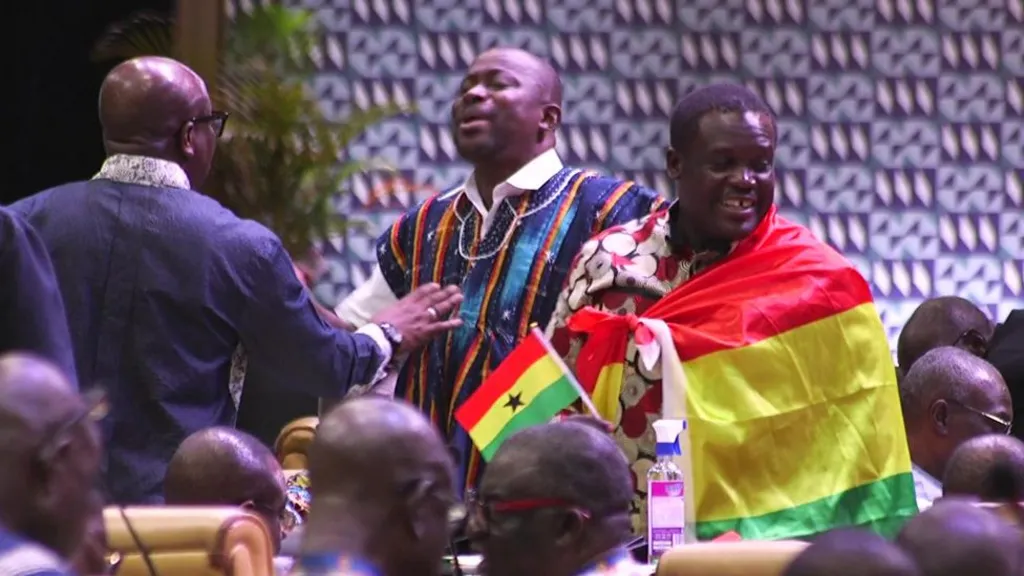Ghana’s Parliament Suspended Amidst Turmoil Over Majority Dispute
3 min read
Ghana's parliament suspended after chaotic scenes

Ghana's parliament suspended after chaotic scenes
Ghana’s parliament has been suspended indefinitely following chaotic scenes over a contentious dispute regarding which party holds the parliamentary majority. The suspension comes after a significant political shift was revealed, involving the defection of four Members of Parliament (MPs) who have announced their intention to run for different parties in the upcoming general election on December 7.
The turmoil began last week when Speaker Alban Bagbin declared the seats of the four defectors vacant, arguing that the Ghanaian constitution prohibits MPs from switching allegiance. This declaration has far-reaching implications, particularly in a parliament that has been finely balanced. With the loss of the four MPs, the opposition National Democratic Congress (NDC) is now positioned as the majority party, a situation that is currently being challenged in court by President Nana Akufo-Addo’s New Patriotic Party (NPP).
In response to Bagbin’s declaration, the NPP sought clarification from the Supreme Court on whether the Speaker had interpreted the constitution correctly. The judges instructed Bagbin to suspend his declaration until a decision could be reached. However, the timeline for the court’s judgment remains uncertain.
Tuesday marked the first parliamentary session since the Supreme Court’s directive, and tensions were palpable. MPs from both the NPP and NDC attempted to claim the seats designated for the majority party, leading to a heated standoff. In an effort to avoid escalating the situation, NPP leader in parliament, Alexander Afenyo-Markin, instructed his party members to walk out.
Following the NPP’s exit, NDC lawmakers began singing party anthems and marching around the chamber in a display of their newfound majority status. Speaker Bagbin noted that without the presence of the NPP legislators, there were not enough MPs in attendance to conduct official business. This prompted him to announce the indefinite suspension of proceedings.
The implications of this suspension are significant, particularly for the government’s ability to secure approval for vital funding and legislation. The halt in parliamentary activity could have far-reaching effects on governance and policy-making in Ghana over the coming year.
Ghana has historically been recognized as one of Africa’s most stable democracies, yet parliamentary and presidential votes often yield remarkably close outcomes. In the 2020 general elections, both the NPP and NDC each secured 137 seats, with the NPP ultimately claiming the majority after gaining the support of an independent legislator.
The recent revelations about the four MPs’ defections only surfaced when the list of candidates for the upcoming election was released. This unexpected political maneuvering has raised concerns among the Ghanaian populace, especially regarding the potential impact on the economy. The high cost of living has emerged as a central issue for both parties as they prepare for the electoral battle.
In the upcoming elections, Vice-President Mahamudu Bawumia is set to represent the NPP, while former President John Mahama is the candidate for the NDC. President Akufo-Addo, who has served two terms in office, will not seek re-election, leaving the field open for new leadership.
The political instability in Ghana comes at a time when many citizens are anxiously watching the developments, worried about how the situation might affect economic conditions and public services. The ongoing political strife has intensified calls for stability and clarity as the nation approaches a crucial electoral period.
As the situation develops, both parties are under pressure to address the pressing issues facing Ghanaians, particularly the economic challenges exacerbated by the current political chaos. With the parliamentary suspension now in effect, questions arise about how effectively the government can navigate these challenges and ensure a smooth transition leading up to the elections.
In summary, Ghana’s parliament is suspended amid a major dispute over party allegiance and majority status, raising significant concerns about the country’s political stability and governance as it approaches a pivotal election. The ongoing situation will require careful navigation by all parties involved to maintain the democratic principles that Ghana has long upheld.